Mozambique - MZ - MOZ - MOZ - Africa
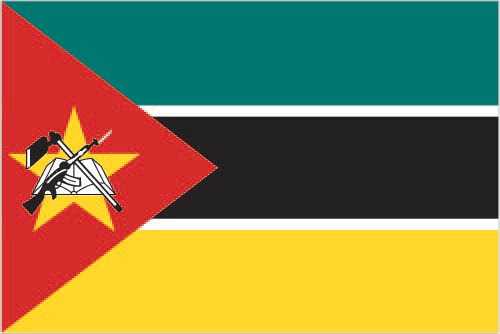
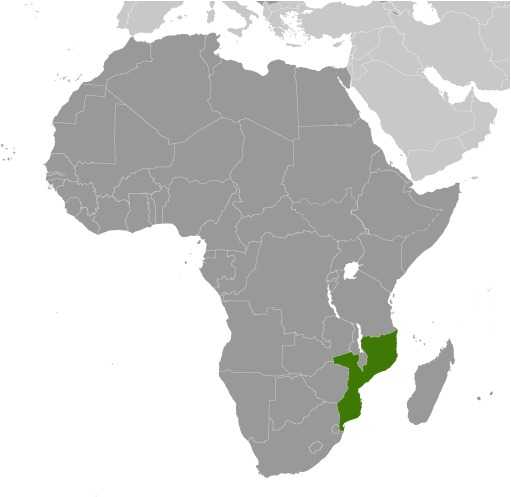
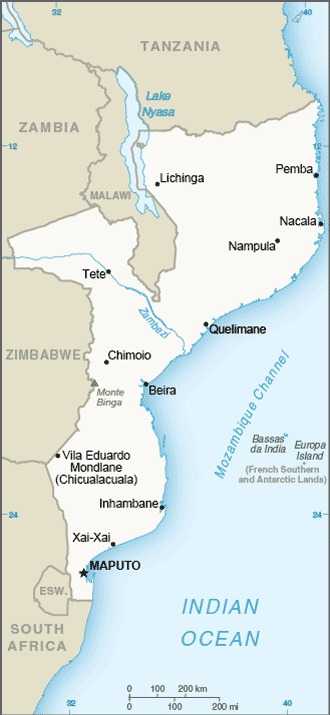
Mozambique Images
Mozambique Factbook Data
Diplomatic representation from the US
embassy: Avenida Marginal 5467, Maputo
mailing address: 2330 Maputo Place, Washington DC 20521-2330
telephone: [258] (84) 095-8000
email address and website:
MaputaConsular@state.gov
https://mz.usembassy.gov/
Age structure
15-64 years: 52.4% (male 8,428,457/female 9,061,065)
65 years and over: 2.9% (2024 est.) (male 473,030/female 490,143)
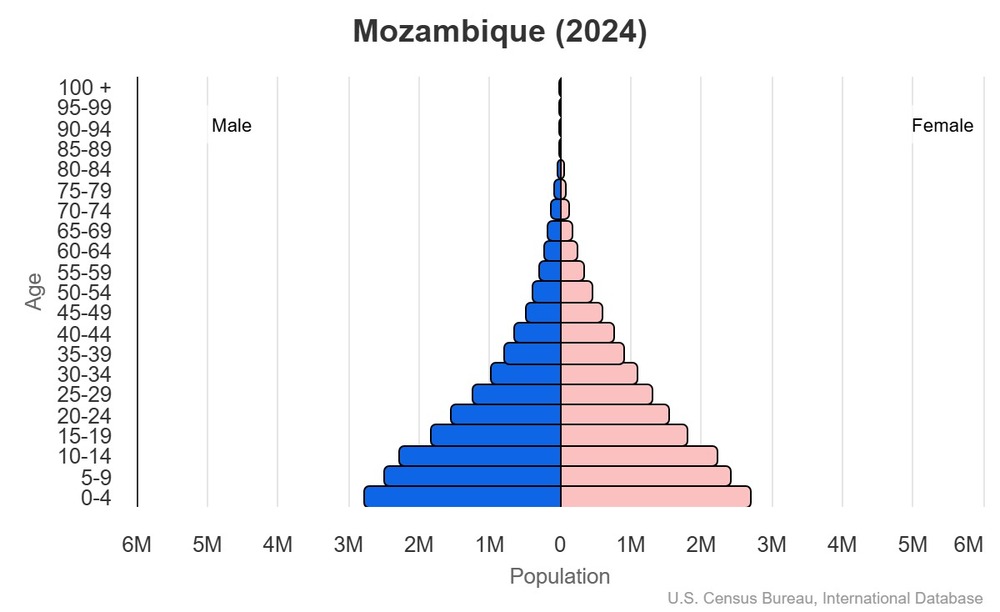
For additional information, please see the entry for Population pyramid on the Definitions and Notes page.
Geographic coordinates
Sex ratio
0-14 years: 1.03 male(s)/female
15-64 years: 0.93 male(s)/female
65 years and over: 0.97 male(s)/female
total population: 0.97 male(s)/female (2024 est.)
Natural hazards
Area - comparative
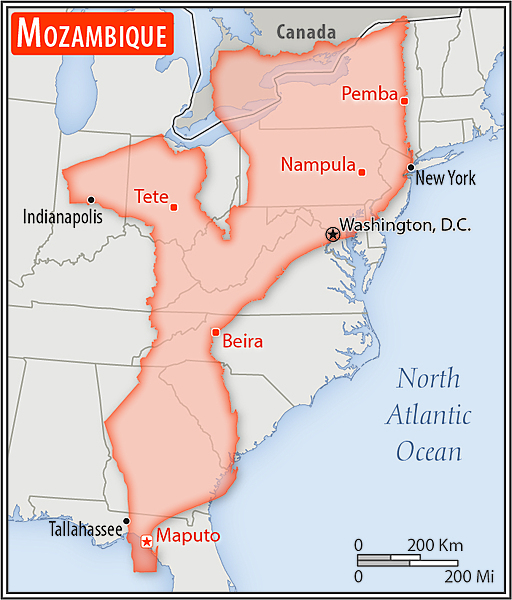
Military service age and obligation
Background
In the first half of the second millennium A.D., northern Mozambican port towns were frequented by traders from Somalia, Ethiopia, Egypt, Arabia, Persia, and India. The Portuguese were able to wrest much of the coastal trade from Arab Muslims in the centuries after 1500, and they set up their own colonies. Portugal did not relinquish Mozambique until 1975. Large-scale emigration, economic dependence on South Africa, a severe drought, and a prolonged civil war hindered the country's development until the mid-1990s.
The ruling Front for the Liberation of Mozambique (FRELIMO) party formally abandoned Marxism in 1989, and a new constitution the following year provided for multiparty elections and a free-market economy. A UN-negotiated peace agreement between FRELIMO and rebel Mozambique National Resistance (RENAMO) forces ended the fighting in 1992. In 2004, Mozambique underwent a delicate transition as Joaquim CHISSANO stepped down after 18 years in office. His elected successor, Armando GUEBUZA, served two terms and then passed executive power to Filipe NYUSI in 2015. RENAMO’s residual armed forces intermittently engaged in a low-level insurgency after 2012, but a 2016 cease-fire eventually led to the two sides signing a comprehensive peace deal in 2019.
Since 2017, violent extremists -- who an official ISIS media outlet recognized as ISIS's network in Mozambique for the first time in 2019 -- have been conducting attacks against civilians and security services in the northern province of Cabo Delgado. In 2021, Rwanda and the Southern African Development Community deployed forces to support Mozambique’s efforts to counter the extremist group.
Environmental issues
International environmental agreements
signed, but not ratified: none of the selected agreements
Military expenditures
2% of GDP (2023 est.)
2% of GDP (2022 est.)
2% of GDP (2021 est.)
1.5% of GDP (2020 est.)
Population below poverty line
note: % of population with income below national poverty line
Household income or consumption by percentage share
highest 10%: 41.1% (2019 est.)
note: % share of income accruing to lowest and highest 10% of population
Exports - commodities
note: top five export commodities based on value in dollars
Exports - partners
note: top five export partners based on percentage share of exports
Administrative divisions
Agricultural products
note: top ten agricultural products based on tonnage
Military and security forces
Ministry of Interior: Mozambique National Police (PRM; includes the Rapid Intervention Unit, UIR), the National Criminal Investigation Service (SERNIC), Border Security Force; other security forces include the Presidential Guard and the Force for the Protection of High-Level Individuals (2025)
note 1: the FADM and other security forces are referred to collectively as the Mozambican Defense and Security Forces (FDS)
note 2: the PRM, SERNIC, and the UIR are responsible for law enforcement and internal security; the Border Security Force is responsible for protecting the country’s international borders and for carrying out police duties within 24 miles of borders
note 3: in 2023, the Mozambique Government legalized local militias that have been assisting security forces operating in Cabo Delgado against Islamic militants since 2020; this Local Force is comprised of ex-combatants and other civilians and receives training, uniforms, weapons, and logistical support from the FADM
Budget
expenditures: $7.223 billion (2024 est.)
note: central government revenues and expenses (excluding grants/extrabudgetary units/social security funds) converted to US dollars at average official exchange rate for year indicated
Capital
geographic coordinates: 25 57 S, 32 35 E
time difference: UTC+2 (7 hours ahead of Washington, DC, during Standard Time)
etymology: named after the Maputo River, which drains into Maputo Bay south of the city; the river is said to be named after the son of Muagobe, a local chief in the 18th century
Imports - commodities
note: top five import commodities based on value in dollars
Climate
Coastline
Constitution
amendment process: proposed by the president of the republic or supported by at least one third of the Assembly of the Republic membership; passage of amendments affecting constitutional provisions, including the independence and sovereignty of the state, the republican form of government, basic rights and freedoms, and universal suffrage, requires at least a two-thirds majority vote by the Assembly and approval in a referendum; referenda not required for passage of other amendments
Exchange rates
Exchange rates:
63.905 (2024 est.)
63.886 (2023 est.)
63.851 (2022 est.)
65.465 (2021 est.)
69.465 (2020 est.)
Executive branch
head of government: Prime Minister Maria Benvinda Delfina LEVI (since 17 January 2025)
cabinet: Cabinet appointed by the president
election/appointment process: president elected directly by absolute-majority popular vote in 2 rounds, if needed, for a 5-year term (eligible for 2 consecutive terms); election last held on 9 October 2024 (next to be held by October 2029); prime minister appointed by the president
most recent election date: 9 October 2024
election results:
2024: Daniel CHAPO elected president in first round; percent of vote - Daniel CHAPO (FRELIMO) 65.2%, Venâncio MONDLANE (PODEMOS) 24.2%, Ossufo MOMADE (RENAMO) 6.6%
Flag
meaning: green stands for the riches of the land, white for peace, black for the African continent, yellow for the country's minerals, and red for the fight for independence; the rifle stands for defense and vigilance, the hoe for agriculture, the open book for the importance of education, and the star for Marxism and internationalism
note: one of two national flags featuring a firearm; the other is Guatemala
Independence
Industries
Judicial branch
judge selection and term of office: Supreme Court president appointed by the president of the republic; vice president appointed by the president in consultation with the Higher Council of the Judiciary (CSMJ) and ratified by the Assembly of the Republic; other judges elected by the Assembly; judges serve 5-year renewable terms; Constitutional Council judges appointed - 1 by the president, 5 by the Assembly, and 1 by the CSMJ; judges serve 5-year nonrenewable terms
subordinate courts: Administrative Court (capital city only); provincial courts or Tribunais Judicias de Provincia; District Courts or Tribunais Judicias de Districto; customs courts; maritime courts; courts marshal; labor courts; community courts
Land boundaries
border countries (6): Malawi 1498 km; South Africa 496 km; Eswatini 108 km; Tanzania 840 km; Zambia 439 km; Zimbabwe 1,402 km
Land use
arable land: 7.2% (2023 est.)
permanent crops: 0.5% (2023 est.)
permanent pasture: 45.1% (2023 est.)
forest: 41.7% (2023 est.)
other: 5.5% (2023 est.)
Legal system
Legislative branch
legislative structure: unicameral
number of seats: 250 (all directly elected)
electoral system: proportional representation
scope of elections: full renewal
term in office: 5 years
most recent election date: 10/9/2024
parties elected and seats per party: Mozambique Liberation Front (FRELIMO) (171); Optimist Party for the Development of Mozambique (PODEMOS) (43); Mozambican National Resistance (RENAMO) (28); Other (8)
percentage of women in chamber: 38.3%
expected date of next election: October 2029
Literacy
male: 74.1% (2022 est.)
female: 50.9% (2022 est.)
Maritime claims
exclusive economic zone: 200 nm
International organization participation
National holiday
Nationality
adjective: Mozambican
Natural resources
Geography - note
Economic overview
Political parties
Liberation Front of Mozambique (Frente de Liberatacao de Mocambique) or FRELIMO
Mozambican National Resistance (Resistencia Nacional Mocambicana) or RENAMO
Railways
narrow gauge: 4,787 km (2014) 1.067-m gauge
Suffrage
Terrain
Government type
Country name
conventional short form: Mozambique
local long form: Republica de Mocambique
local short form: Mocambique
former: Portuguese East Africa, People's Republic of Mozambique
etymology: named for an offshore island; the island was named after Mussa bin BIQUE (or Mussa Ibn MALIK), an influential Arab slave trader who set himself up as sultan on the island in the 15th century
Location
Map references
Irrigated land
Diplomatic representation in the US
chancery: 1525 New Hampshire Avenue NW, Washington, DC 20036
telephone: [1] (202) 293-7147
FAX: [1] (202) 835-0245
email address and website:
washington.dc@embamoc.gov.mz
https://usa.embamoc.gov.mz/
Internet users
Internet country code
Refugees and internally displaced persons
IDPs: 718,154 (2024 est.)
GDP (official exchange rate)
note: data in current dollars at official exchange rate
Total renewable water resources
School life expectancy (primary to tertiary education)
male: 11 years (2017 est.)
female: 10 years (2017 est.)
Urbanization
rate of urbanization: 4.24% annual rate of change (2020-25 est.)
Broadcast media
Drinking water source
urban: 87.3% of population (2022 est.)
rural: 48.3% of population (2022 est.)
total: 63.2% of population (2022 est.)
unimproved:
urban: 12.7% of population (2022 est.)
rural: 51.7% of population (2022 est.)
total: 36.8% of population (2022 est.)
National anthem(s)
lyrics/music: Salomão J. MANHICA/unkown
history: adopted 2002; the new anthem reflects the new multi-party political system
Major urban areas - population
International law organization participation
Physician density
Hospital bed density
National symbol(s)
Mother's mean age at first birth
note: data represents median age at first birth among women 20-49
GDP - composition, by end use
government consumption: 17.1% (2024 est.)
investment in fixed capital: 24.1% (2024 est.)
investment in inventories: 0% (2024 est.)
exports of goods and services: 42.7% (2024 est.)
imports of goods and services: -52.9% (2024 est.)
note: figures may not total 100% due to rounding or gaps in data collection
Dependency ratios
youth dependency ratio: 85.2 (2024 est.)
elderly dependency ratio: 5.5 (2024 est.)
potential support ratio: 18.2 (2024 est.)
Citizenship
citizenship by descent only: at least one parent must be a citizen of Mozambique
dual citizenship recognized: no
residency requirement for naturalization: 5 years
Population distribution
Electricity access
electrification - urban areas: 79.4%
electrification - rural areas: 5%
Civil aircraft registration country code prefix
Sanitation facility access
urban: 71.8% of population (2022 est.)
rural: 24.3% of population (2022 est.)
total: 42.4% of population (2022 est.)
unimproved:
urban: 28.2% of population (2022 est.)
rural: 75.7% of population (2022 est.)
total: 57.6% of population (2022 est.)
Ethnic groups
Languages
Imports - partners
note: top five import partners based on percentage share of imports
Elevation
lowest point: Indian Ocean 0 m
mean elevation: 345 m
Health expenditure
8% of national budget (2022 est.)
Military - note
Military and security service personnel strengths
Terrorist group(s)
note: details about the history, aims, leadership, organization, areas of operation, tactics, targets, weapons, size, and sources of support of the group(s) appear(s) in the Terrorism reference guide
Total water withdrawal
industrial: 25 million cubic meters (2022 est.)
agricultural: 1.076 billion cubic meters (2022 est.)
Waste and recycling
percent of municipal solid waste recycled: 5.2% (2022 est.)
Major watersheds (area sq km)
Major lakes (area sq km)
Major rivers (by length in km)
note: [s] after country name indicates river source; [m] after country name indicates river mouth
National heritage
selected World Heritage Site locales: Island of Mozambique
Coal
consumption: 13,000 metric tons (2023 est.)
exports: 10.658 million metric tons (2023 est.)
imports: 900 metric tons (2023 est.)
proven reserves: 1.792 billion metric tons (2023 est.)
Electricity generation sources
solar: 0.4% of total installed capacity (2023 est.)
hydroelectricity: 82.7% of total installed capacity (2023 est.)
biomass and waste: 0.6% of total installed capacity (2023 est.)
Natural gas
consumption: 1.625 billion cubic meters (2023 est.)
exports: 7.09 billion cubic meters (2023 est.)
proven reserves: 2.832 trillion cubic meters (2021 est.)
Petroleum
Currently married women (ages 15-49)
Remittances
1.2% of GDP (2023 est.)
0.9% of GDP (2022 est.)
note: personal transfers and compensation between resident and non-resident individuals/households/entities
Ports
large: 0
medium: 2
small: 5
very small: 4
ports with oil terminals: 3
key ports: Beira, Chinde, Inhambane, Maputo, Mocambique, Pebane, Porto Belo
Child marriage
women married by age 18: 52.9% (2015)
men married by age 18: 9.7% (2015)
National color(s)
Particulate matter emissions
Methane emissions
agriculture: 169.5 kt (2019-2021 est.)
waste: 117.5 kt (2019-2021 est.)
other: 101.2 kt (2019-2021 est.)
Labor force
note: number of people ages 15 or older who are employed or seeking work
Youth unemployment rate (ages 15-24)
male: 7.5% (2024 est.)
female: 7.2% (2024 est.)
note: % of labor force ages 15-24 seeking employment
Debt - external
note: present value of external debt in current US dollars
Maternal mortality ratio
Reserves of foreign exchange and gold
$3.637 billion (2023 est.)
$2.939 billion (2022 est.)
note: holdings of gold (year-end prices)/foreign exchange/special drawing rights in current dollars
Public debt
note: central government debt as a % of GDP
Unemployment rate
3.6% (2023 est.)
3.6% (2022 est.)
note: % of labor force seeking employment
Population
male: 16,449,734
female: 16,901,220
Carbon dioxide emissions
from coal and metallurgical coke: -68,287 metric tonnes of CO2 (2023 est.)
from petroleum and other liquids: 6.244 million metric tonnes of CO2 (2023 est.)
from consumed natural gas: 3.373 million metric tonnes of CO2 (2023 est.)
Area
land: 786,380 sq km
water: 13,000 sq km
Taxes and other revenues
note: central government tax revenue as a % of GDP
Real GDP (purchasing power parity)
$50.844 billion (2023 est.)
$48.222 billion (2022 est.)
note: data in 2021 dollars
Airports
Gini Index coefficient - distribution of family income
note: index (0-100) of income distribution; higher values represent greater inequality
Inflation rate (consumer prices)
7.1% (2023 est.)
10.3% (2022 est.)
note: annual % change based on consumer prices
Current account balance
-$2.207 billion (2023 est.)
-$6.367 billion (2022 est.)
note: balance of payments - net trade and primary/secondary income in current dollars
Real GDP per capita
$1,500 (2023 est.)
$1,500 (2022 est.)
note: data in 2021 dollars
Broadband - fixed subscriptions
subscriptions per 100 inhabitants: (2022 est.) less than 1
Tobacco use
male: 23% (2020 est.)
female: 5.6% (2020 est.)
Obesity - adult prevalence rate
Energy consumption per capita
Electricity
consumption: 12.983 billion kWh (2023 est.)
exports: 11.483 billion kWh (2023 est.)
imports: 8.287 billion kWh (2023 est.)
transmission/distribution losses: 3.38 billion kWh (2023 est.)
Merchant marine
by type: general cargo 9, other 27
Children under the age of 5 years underweight
Imports
$11.18 billion (2023 est.)
$15.932 billion (2022 est.)
note: balance of payments - imports of goods and services in current dollars
Exports
$9.405 billion (2023 est.)
$9.409 billion (2022 est.)
note: balance of payments - exports of goods and services in current dollars
Telephones - fixed lines
subscriptions per 100 inhabitants: (2022 est.) less than 1
Alcohol consumption per capita
beer: 1.03 liters of pure alcohol (2019 est.)
wine: 0.22 liters of pure alcohol (2019 est.)
spirits: 0.21 liters of pure alcohol (2019 est.)
other alcohols: 0 liters of pure alcohol (2019 est.)
Life expectancy at birth
male: 57.1 years
female: 59.6 years
Real GDP growth rate
5.4% (2023 est.)
4.4% (2022 est.)
note: annual GDP % growth based on constant local currency
Industrial production growth rate
note: annual % change in industrial value added based on constant local currency
GDP - composition, by sector of origin
industry: 24.6% (2024 est.)
services: 38.4% (2024 est.)
note: figures may not total 100% due to non-allocated consumption not captured in sector-reported data
Education expenditure
20.4% national budget (2021 est.)
Military equipment inventories and acquisitions
Religions
Gross reproduction rate
Net migration rate
Median age
male: 16.7 years
female: 17.9 years
Total fertility rate
Infant mortality rate
male: 60.1 deaths/1,000 live births
female: 56.2 deaths/1,000 live births
Telephones - mobile cellular
subscriptions per 100 inhabitants: 42 (2022 est.)